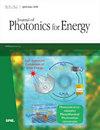户外日光紫外线荧光成像装置的设计和开发:一种检测光伏组件退化的廉价工具
IF 2.1
4区 工程技术
Q4 MATERIALS SCIENCE, MULTIDISCIPLINARY
引用次数: 0
摘要
摘要紫外荧光(UVF)成像是一种广泛应用的分析密封剂变色的技术,这是光伏组件中一种突出的降解模式。按照惯例,紫外线是在夜间或暗室中进行的,但在夜间进行紫外线成像会带来一些不便,包括蛇和其他动物造成的安全问题,以及工厂所有者不方便的日程安排问题。同样,在室内进行UVF成像需要将模块从机架上卸下并移到实验室,这是一项劳动密集型且耗时的任务,可能会损坏模块,或可能因部分/全部工厂/阵列关闭而导致能量损失。此外,如果模块从机架上拆下,制造商/安装商的保修可能会失效。可以在白天使用的室外UVF设置可以更好地替代室内或夜间设置,前提是它可以确保环境光不会泄漏到覆盖的测试结构中。我们提出了一种独特、便携、用户友好的户外紫外线设置设计,可以解决环境光泄漏的问题,提供均匀的紫外线,并提供足够的空间容纳紫外线光源和相机来捕捉模块图像。我们还根据变色强度水平将密封剂变色分为三类。此外,使用图像处理技术,计算每个细胞/模块中的褐变百分比。本文章由计算机程序翻译,如有差异,请以英文原文为准。
Design and development of outdoor daylight ultraviolet fluorescence imaging setup: an inexpensive tool to detect degradation of photovoltaic modules
Abstract. Ultraviolet fluorescence (UVF) imaging is a widely used technique to analyze encapsulant discoloration, which is one of the prominent degradation modes in photovoltaic (PV) modules. Conventionally, UVF is done during nighttime or in a dark room, but performing UVF imaging during nighttime causes several inconveniences including safety due to snakes and other animals and inconvenient scheduling issues for the plant owners. Similarly, performing UVF imaging indoors requires dismounting the modules from the racks and moving them to the laboratory, which are labor-intensive and time-consuming tasks and could damage the module or may cause the energy loss due to partial/complete plant/array shutdown. Moreover, the manufacturer/installer warranty may be voided if the modules are removed from the racks. An outdoor UVF setup that can be used during the daylight can be a better alternative to the indoor or nighttime setup, provided it ensures there is no leakage of ambient light into the covered testing structure. We propose a unique, portable, and user-friendly outdoor UVF setup design that can tackle the issue of the ambient light leaking in, give uniform UV light, and provide enough room to accommodate the UV light source and camera to capture module images. We also classify the encapsulant discoloration into three classes depending on the discoloration intensity level. Furthermore, using the image processing technique, the percentage of browning was calculated in each cell/module.
求助全文
通过发布文献求助,成功后即可免费获取论文全文。
去求助
来源期刊

Journal of Photonics for Energy
MATERIALS SCIENCE, MULTIDISCIPLINARY-OPTICS
CiteScore
3.20
自引率
5.90%
发文量
28
审稿时长
>12 weeks
期刊介绍:
The Journal of Photonics for Energy publishes peer-reviewed papers covering fundamental and applied research areas focused on the applications of photonics for renewable energy harvesting, conversion, storage, distribution, monitoring, consumption, and efficient usage.
 求助内容:
求助内容: 应助结果提醒方式:
应助结果提醒方式:


